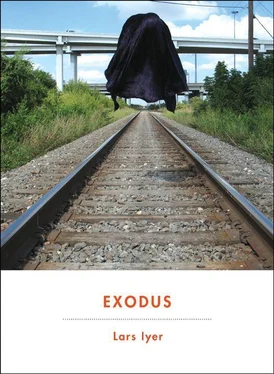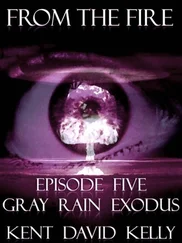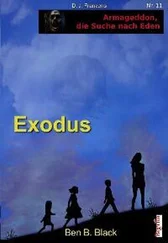Away-From-Here: that’s where the Essex postgraduates went. Away-From-Britain. That’s where he should have gone, W. says: Away-From-Britain. He should have stayed overseas after his studies.
Why did he come crawling back? What secret fatality led him home? Why was he chained to Britain as a dog to its vomit? Was it some inadequacy? Some sense that he didn’t belong among the cafés and cobbled streets? Was it British inadequacy? British stupidity? A British inability to take himself seriously as a thinker?
Away-From-Here … But he’ll never get away, will he? W. says. There’s Canada, of course, his Canadian dream. But the Canadian universities don’t even reply to his job applications. They don’t even send him rejection letters …
He’s been left behind , W. says. He and some of the other former Essex postgraduates, who found academic jobs instead of leaving Britain. They compromised, he says, they who had been shown that life is elsewhere , and that one should try to struggle into that elsewhere; that life flared into its fullness somewhere else, in another place; that life moved in Old Europe like fire in fire, like weather on the sun …
Life was elsewhere. Life is elsewhere, that much is clear to him, W. says.
A chance, a promise. That’s what they were given, the Essex postgraduates. Life was elsewhere … They lived in the wrong age, and in the wrong country. They were men and women out of time and out of place.
Their ideas weren’t British ideas, or at least not current British ideas, W. says. Their ideas weren’t commercial ideas, ideas that belong to the new reality. Ah, in another country, they thought back then, things would be completely different.
Wouldn’t they have been taken by the arm and treated with great politeness and interest in Mediterranean countries — in religious or recently religious countries — where you can still discuss Cohen and Rosenzweig over olives and chorizo? Wouldn’t they have found allies and admirers in the countries of Eastern Europe — in political or recently political countries — where you can still discuss Marx over your weissbiers, where Weil and Kierkegaard are on everyone’s minds?
Of course, they all study philosophy at school, in Old Europe, the Essex postgraduates knew that. Everyone knows a little something about philosophy. Everyone has something philosophical to say. It’s in their blood. In the air! It’s in the aether of Old Europe, the Essex postgraduates said to one another. It’s in the cafés and wine cellars. It’s in the city squares and riverside parks. And can’t you see it shining out in the faces of children?
Old Europe, Old Europe. But its day was passing, the Essex postgraduates knew that. And so the promise of their day was passing, they who never really knew Old Europe. Their philosophy would die unnoticed: how could it be otherwise? The ideas of Old Europe would not take root here.
They would have to fly off elsewhere, the Essex postgraduates, as dandelion seeds of thought. They would have to take root in South America, perhaps — in Argentina, which is supposed to be a very thoughtful country, a real thinking country ; in Columbia, which has philosophy departments like great castles; in Uruguay, which probably already harboured the thinker-friends who would take the next great leap of thought.
Or they would have to reach fertile ground in vast China, vast India, or in overcrowded Japan. Somewhere, someplace else, they would have to find the countries of thought . Somewhere beyond Europe, itself no longer fertile soil for the ideas of its thinkers …
Ah, its time had come, Old Europe. Its time was already overdue. Old Europe had already outlived itself, was already posthumous. But didn’t it dream nonetheless? Didn’t it send its dreams back from the other side of death? Were they Old Europe’s dreams, the Essex postgraduates? W. wonders. Were they the way Old Europe dreamed of coming once more to itself, now and in Essex?
Now and in Essex, now and in Essex. W. has always had a waking dream that our country might become the next country of philosophy . He’s always dreamt — and he knows it’s ridiculous — that something might begin in our Britain: that a day might come, that the chance of a day might come. That the sunrays from old Europe, from the sun-touched countries of the south, might burst through our northern clouds. That a heavenly fire might illuminate our ancient landscapes and break across our upturned faces …
And on that day, that bright impossible day, our tears would flow, W. says. Our hearts would melt, our knees buckle. We would fall into the arms of thought. Thought would be as easy as falling. We’d speak to each other at last. We’d hear each other speak — at last, at last!
The train to Edinburgh.
W. reads to me from his notebook:
A rabbi, a real cabbalist, once said that in order to establish the reign of peace it is not necessary to destroy everything nor to begin a completely new world. It is sufficient to displace this cup or this brush or this stone just a little, and thereby everything .
Imagine it! Two plastic cups of Plymouth Gin might usher in the reign of peace , W. says.
There’s no gin, so we settle for cans of Stella from the trolley. To the sea! we toast, banging our cans together.
He doesn’t really know the North Sea, W. says. He doesn’t really feel it. What lies across the water, for instance? He doesn’t even know that … Denmark, I tell him. Travel east, and we’d reach Jutland, and the port of Esbjerg. Ah, the land of the Vikings! W. says. — ‘Your people, pillaging and marauding …’
Of course, I’ve always maintained that the Vikings have been misunderstood by history, W. says. They were a melancholy people, first and foremost, I’ve told him. A people of tungsind , of heavy-souledness, I’ve insisted.
The Vikings knew their time had passed, I’ve told W. They knew that their Ragnarok was due; that a new religion was coming that would sweep the old one away. It was because Christianity was coming to their northlands that they sailed to Lindesfarne and smashed the Abbey, I’ve said to W. And it was a sense of their own posthumousness that drove them to pillage and maraud their way across Christian Europe.
And wasn’t it the same heavy-souledness which drove them to the New World, to settle in Newfoundland? Wasn’t it Viking heavy-souledness that led them southwards, down the coast of present-day North America, all the way to what became Mexico? They wanted to escape, I’ve told W. To escape themselves! To leave themselves behind! That’s why they founded Viking settlements along the edge of East Africa, and in pockets of India, where blue-eyed, heavy-souled natives claim ancestry from lost Danish colonies.
We must be gentle with our Edinburgh friend (W.’s Edinburgh friend), W. says. He is the most delicate of men, as thinkers are often delicate. The most fragile. His poor health … his withered arm … his spasms and tics …
But as he shows us around Edinburgh, our Edinburgh friend (W.’s Edinburgh friend) seems anything but fragile.
The New Town was going to be built in the form of a Union Jack, our Edinburgh friend (W.’s Edinburgh friend) tells us, and we marvel. Imagine that! He tells us the story behind the Act of Union, which saw Scotland united with England in order that its rich elite might gain access to the market of the English colonies. ‘ We were bought and sold for English gold ’, says our Edinburgh friend (W.’s Edinburgh friend), quoting Rabbie Burns. And on the day the treaty was signed, the bells of St Giles Cathedral rang out Why Should I Be Sad On My Wedding Day …
Читать дальше












